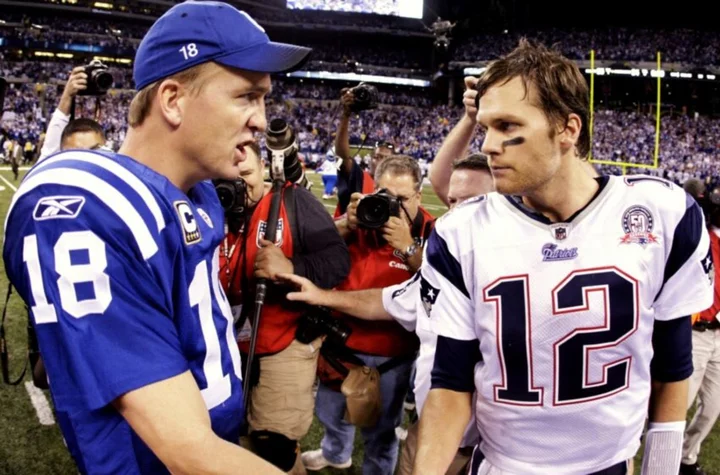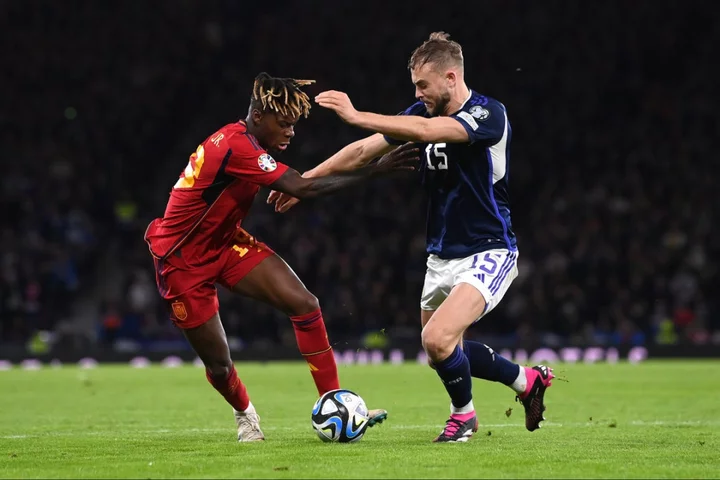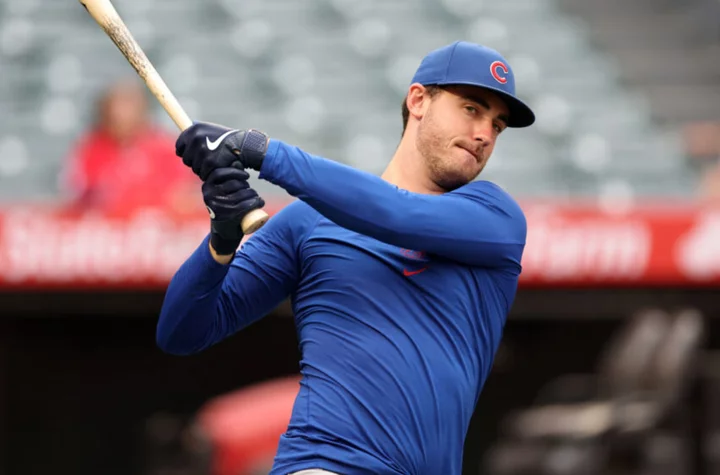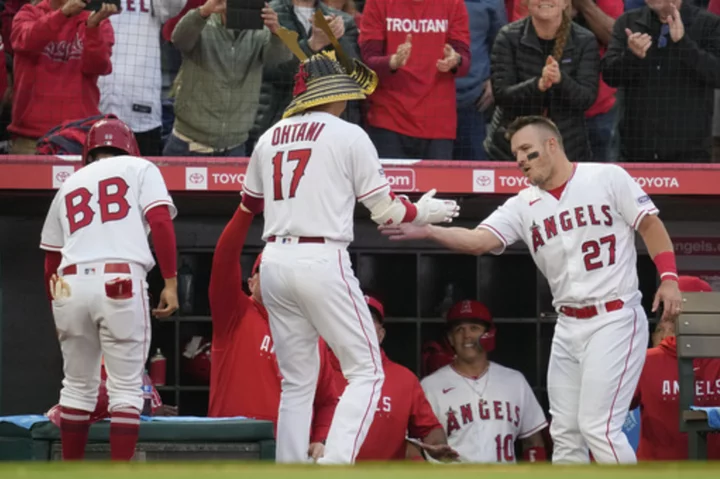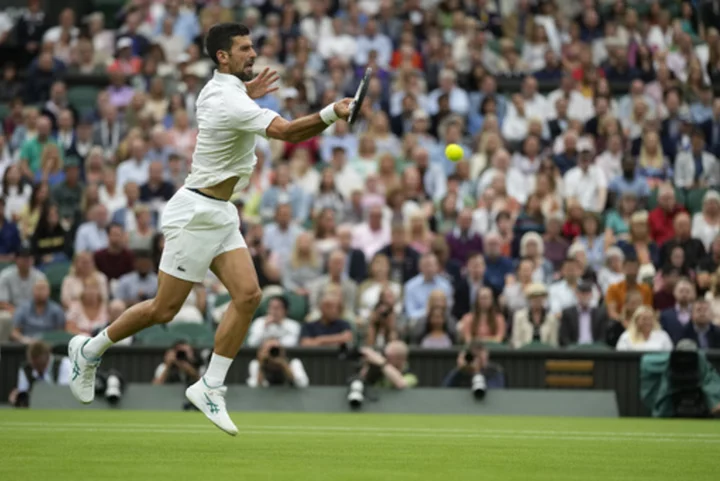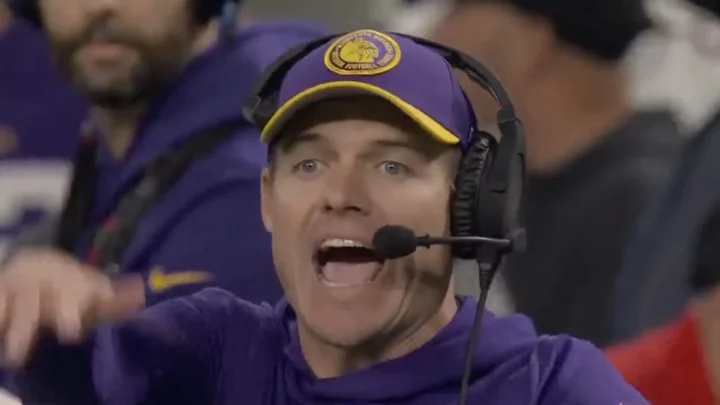With the 2022 season wrapped up, here's a look at ten of the best rivalries between individual players in all of NFL history.
In the NFL's illustrious 103-year history, the league has encouraged football in its most pristine form. In the 1920s, that meant leather helmets and victory formation. In the 1970s, defenders slammed into skill players with plastic helmets, laying them out on the green. And in the 2000s, a fierce rivalry between the New England Patriots and Indianapolis Colts birthed the strict pass interference rules seen today.
The NFL has often brought out the best in its players, but gridiron grit also has a history of bringing out the worst. The closest teammates worked in telepathic tandem, while bitter rivals sized each other up and tore each other down whenever possible.
Rivalries have come in a multitude of forms over the century, from Sam Huff slowing down Jim Brown to Ndamukong Suh riling up Aaron Rodgers with an ankle stomp. Some rivalries were based on mutual respect for a player's craft, while others bubbled up into forceful shoves, slaps and slams.
There are rivalries between dueling quarterbacks, such as Jim Kelly versus Dan Marino or Tom Brady versus Peyton Manning, and there are rivalries between offensive and defensive players directly facing one another, such as Ray Lewis versus Eddie George.
While there are a multitude of feuds to choose from, the following list was compiled in consideration of diversifying era and position. A list could be dedicated to the numerous quarterback rivalries in NFL, while another could consist of big-name rivalries before 1970. Ranking them is entirely subjective, but this collection features notable rivalries involving a variety of positions, such as linebackers and defensive linemen targeting running backs and quarterbacks.
10 best individual player rivalries in NFL history
10. Bill Bergey vs. Conrad Dobler
In the 1970s, NFL football adhered to fewer restrictions, but there was still a notion of playing with etiquette. Even today, every play has the potential to draw a flag — there's always an illegal shove or late tackle that goes unnoticed. The players who consistently flout the rules, especially to cause unnecessary harm, garner a reputation for being "dirty." In the late 1970s, that was Saints guard Conrad Dobler.
Dobler passed away this February, and when the news broke, he was characterized as "one of NFL's dirtiest players" in a New York Post headline. According to the NY Post, Dobler frequently relied on "illegal tactics like holding, eye-gouging, leg-whipping and biting among them."
"It is still the only sport where there is controlled violence mixed with careful technical planning," Dobler once said in an NFL survey. "I'll do anything to protect my quarterback," he told Sports Illustrated in 1977.
In his lengthy SI profile, Dobler responded with humor when questioned about his reputation in the league.
"In one game I was called for tripping a guy who was standing up," Dobler said. "Sure I tried to trip him, but I didn't succeed, and attempted tripping is not illegal."
Dobler may have joked, but as his profile suggested, he was considered the dirtiest player in the NFL during that era. Rams defensive tackle Merlin Olsen may have sworn off even saying Dobler's name, but it was legendary Philadelphia Eagles linebacker Bill Bergey who took issue with Dobler's questionable tactics.
An excerpt from another article in SI's Vault delineates the tension that grew between these two rivals:
"Eagles linebacker Bill Bergey and Saints guard Conrad Dobler developed something of a blood rivalry in the late '70's, a passionate hatred that often resulted in cheap-shot contests and verbal altercations. Bergey, one of the most ferocious tacklers in the league and a proponent for playing the game the "right way," could not stand the notoriously "dirty" Conrad Dobler. Ironically, Bergey's career-ending knee injury came on a play in which he was lined up against Dobler (though blame goes to the Astroturf, not Dobler)."
Additionally, a Reddit post on Bergey's career highlights his feud with Dobler, noting that it is believed to have begun during the 1973 season because Dobler seemed to target Bergey excessively. A blog site dedicated to the NFL in the 1970s claims that Dobler once admitted Bergey was the better football player, so Dobler had to distract him with his antics. In turn, Bergey reportedly said that he "hated everything about him."
Bergey wasn't the only player to hate Dobler, but he was the one to forge a longstanding, heated rivalry with him. It's uncommon to see guards brawling with linemen and linebackers, and it's even rarer to see one bite an opponent's ankle. In an earlier time, both Dobler and Bergey developed their principles on the "right way" to play the game, and that's partially what they battled over every time they faced one another.
9. Aaron Rodgers vs. Ndamukong Suh
In today's NFL, it would be impossible for Conrad Dobler's methods to go entirely unnoticed. The various camera angles, instant replays and increased challenge opportunities allow for more scrutiny, as does the advent of social media amplifying fan-made claims. If someone saw Dobler bite an ankle, it's likely that image would be broadcast all over the Internet.
Still, that doesn't mean players don't embrace Dobler's antagonistic spirit. From Vontaze Burfict to Ndamukong Suh, there are defensive players who have become renowned for playing "dirty" with plenty of reports and footage to back up those claims. Suh may insist that he doesn't play dirty, but there was a time when his NFL peers strongly disagreed. In 2011 and 2012, Suh was voted as the NFL's dirtiest player in a poll by Sporting News.
"The type of hits he puts on quarterbacks, the way he finishes guys — some of them are legal, but a lot of them, I'd say, are over the top," said an anonymous NFL defensive player.
"Over the top" is one way to describe Suh's treatment of the Green Bay Packers in 2011, when he was suspended for stomping on Packers offensive lineman Evan Dietrich-Smith. Three years later, he was fined $70,000 for stomping on Aaron Rodgers.
Will Buikema of SB Nation's Secret Base chronicles the timeline between Suh and Rodgers since Suh was drafted in 2010, including context as to why Suh approaches quarterbacks with fervor. Suh's way of keeping a chip on his shoulder has resulted in several penalties and injuries, the most prominent one being his ankle stomp on Rodgers.
Suh has been quiet since 2018, which is the last season in which he's incurred an NFL fine. Since then, he was able to win a Super Bowl with the Tampa Bay Buccaneers and advance to another one with the Philadelphia Eagles. Suh describes himself as an "aggressive player", and it seems that he's been able to channel that aggression into playing his position rather than the excessive roughness observed early in his career.
"It doesn't bother me because they haven't taken the time to sit down with me one-on-one and have a conversation with me," Suh told MLive in 2023 when asked about his reputation. "You can't call me something that has not consistently shown itself. Off the field, you don't see that in my daily life. None of my teammates say it, which is the most important thing — none of my coaches."
Rodgers has spoken out about his relationship with Suh, namely on The Pat McAfee Show. In 2020, Rodgers said that their rivalry hasn't been "cordial" over the years and that the two have had "some battles." Still, Rodgers imagined that the two might make up during Week 6 of the 2020 season. "I was under the impression we were going to have a conversation after the game. It was one of those I'm old, you're old, let's talk some things out," Rodgers told McAfee.
In January 2021, Rodgers was asked if he would try to talk to Suh following the NFC Championship game since the two were never able to the air. "I don't think there will be a whole lot of conversation this week," Rodgers replied.
After the Packers lost and the Buccaneers won the Super Bowl, Suh clarified that his job is anger Rodgers on the field, but he'd like to connect at some point off of it.
Suh and Rodgers could be facing off once again in 2023, depending on Suh's free agency situation. If they do, NFL fans could see another year of one of the league's longest-standing active rivalries, one that these two veterans haven't quite put to rest.
8. Tom Brady vs. Baltimore Ravens defense [Ray Lewis, Ed Reed, Terrell Suggs]
For someone who terrorized the NFL for 23 years, Tom Brady has his fair share of contentious rivalries, most of them being one-sided. There were plenty of players who lamented about Brady and the Patriots over the years, cursing New England for undeservedly advancing to another Super Bowl as they kept the rest of the AFC out of it.
But there were a few AFC teams who held their own against the Patriots, pitting Brady against Hall of Fame defenders in matchups that hinged on uncertainty. Two of their strongest rivals resided in the AFC North: the Pittsburgh Steelers and the Baltimore Ravens.
Brady and the Ravens' defense developed a unique rivalry because the way in which each Raven responded to Brady differed. Ray Lewis and Ed Reed have spoken at length about how and why Brady is exceptional, and inversely, Brady has lauded Lewis and Reed for being two of the greatest footballers he's ever seen. Terrell Suggs, however, represents the other iteration of a sports rivalry: he's not a fan of Brady. The fact that the Ravens' defense hosted multiple elite players who each fostered powerful rivalries against Brady cements the Ravens-Patriots rivalry as being one of the most competitive throughout the 2000s.
There's an 11-minute video compilation of Lewis and Reed discussing what it was like to play against Brady because, for these three players, it was arguably the greatest challenge of their respective careers. Last year, Brady named Reed as the defensive back he hated playing against the most. Another clip shows Brady and Reed hugging while Brady calls Reed his "kryptonite." A Hall of Fame safety who graced the NFL 100 list alongside Brady and Lewis, Reed is a strong contender for being the greatest free safety of all time. A clip from NFL Network captures trash talk between Lewis and Brady during the 2011 AFC Championship: Lewis reminds his teammates that it's a "chess match" against Brady, and the two talk back to one another on the field. After the Patriots won, Brady told Lewis, "You're the best, you know that? I love you, man."
Even though Lewis and Reed praise Brady's talents today, it doesn't mean the quarterback hasn't had his skirmishes with these players. In 2015, Lewis said that the Tuck Rule is what made Brady famous, not his ability to play. Lewis later clarified that his disdain was directed at the rule rather than Brady, but his original quote paints an unflattering portrait of his longtime rival.
Another example of this was in 2013 as the Ravens defeated the Patriots on their way to a Super Bowl victory. Brady slid into Reed's leg in a controversial manner, but the way the two approached the situation indicates how much the two players respect one another. Reed said that he and Brady spoke on the phone and Brady apologized, clarifying that he didn't think Brady was a "dirty" player.
Suggs and Brady are the two who fostered a different dynamic, with teasing quotes back and forth shared via press. During a 2010 game, Suggs sent Brady to the turf and Brady gestured for a flag, after which the two started yelling back and forth. After the game, Suggs suggested Brady hope that he doesn't "see them again," to which Brady replied, "They talk a lot for only beating us once in nine years."
For the most part, Suggs is the one who made comments about Brady, but it also falls in line with how he motivated himself on the field. "T-Sizzle" describes how Suggs simmered on the field and in interviews, and for the better part of a decade, Suggs took plenty of shots at Brady. Another video compilation chronicling the mostly "one-sided" feud between Brady and Suggs details how it began in 2009, continuing through several key matchups between the AFC giants. Suggs indicated that Brady and Peyton Manning get preferential treatment from referees, reinforcing the popular notion that Brady benefits from unfair calls and rule changes. Soon after, Suggs said that Brees was better than Brady and Manning, admitting that maybe it was a "personal vendetta" against the other two but Brees has the "numbers" and "hardware" to prove it. Suggs took the pettiness to hilarious heights when he nominated Philip Rivers, Peyton Manning and Ryan Fitzpatrick for the Pro Bowl when Brady won NFL MVP for the 2010 season.
The next year, Suggs claimed the Patriots' first three Super Bowl victories were "questionable." After the Ravens won the AFC Championship in 2011, while Lewis and Brady were congratulating each other, Suggs called the Patriots "arrogant", telling them to "have fun at the Pro Bowl." In a 2013 interview with ESPN, Suggs admitted he doesn't like Brady because of his "hair" and his "smug attitude." Suggs also confirms that it all started in 2009 when Brady received a flag for Suggs falling on his leg, which makes sense when considering all of Suggs' comments about Brady. Along the way, he's suggested that Brady is privileged and even "worshipped", which results in unfair treatment for the quarterback and against defenders like Suggs. When Brady called Suggs "phenomenal" in 2013, Suggs seemed surprised and hardly insulted the quarterback afterward.
Eventually, the rivalry cooled on Suggs' end as he dodged chances to insult Brady. When Suggs was given an opportunity to diminish Brady's accomplishments after Deflategate, he instead gave credit to the quarterback for always finding a way to win. "That's a good bait question, I like it," Suggs laughed.
Tom Brady's relationship with each of these Ravens players is steeped in respect, even if there were moments where the players lamented the league's treatment of quarterbacks versus defenders. For the teams they represented and the quality of football these athletes offered, the rivalry between Brady and the Ravens is one that has few, if any, parallels.
7. Ray Lewis vs. Eddie George
Ray Lewis had his moments with Tom Brady, but their rivalry was nothing compared to what he had against Tennessee Titans running back Eddie George.
The linebacker and running back were both drafted in the 1996 NFL Draft and as AFC North rivals at the time, saw each other frequently. George was a Heisman winner and the 1996 Offensive Rookie of the Year; Ray was a second-team All-Pro Pro Bowler who led the NFL in tackles in his 1997 season.
Lewis admitted that the Ravens weren't strong until 2000, but that didn't faze him in his matchups against the Titans. Instead, his eyes were locked with George, and he was hoping to make him flinch.
"Ray and I didn't like each other," George told NFL Films. "It was more than just a game. It was personal."
"One person. Not the team — there was one person on my mind the entire offseason, and that was Eddie George," Lewis said.
"The rest of the league did not matter, because we knew the brand of football we both played," George said.
Calling it "an intense rivalry", Lewis described how he and George would line up against one another and stare directly into each other's eyes, challenging each other before each play. "If you blink and you wink and you shut them, I got you," Lewis explained. With George, "Nobody was gonna blink."
"That joker ain't never shut 'em," Lewis said.
The two "lions", as Lewis described them, endured their most decorated battles in the playoffs. In 2000, Lewis got the edge as he defeated George's Titans in the AFC Divisional round. Getting a powerful hit on George that knocked him off his game, Lewis remembered thinking that "there's a new sheriff in town."
That was until 2003 when George dislocated his left shoulder in the AFC Wild Card round. George not only managed to pop his shoulder back into place, but he managed to stiff-arm Lewis as he barreled toward a win for the Titans.
"I was willing to die on that football field that day," George said, insisting that he still feels that way about that contentious matchup.
Lewis maintains that "there's never been a rivalry between two warriors" like the one he and George share, but these days, the fierce former rivals have put their swords down. The two friends frequently conduct interviews together discussing their battles on the field and their friendship off of it.
Lewis explained to Rich Eisen that after regular season games and at the Pro Bowl, the two would hang out and go to bars together. But once they were on the green, there was a "switch."
"We had this ultimate respect for each other, but there was this ultimate competitive spirit," Lewis said.
Laughing with former Ravens tight end Shannon Sharpe, George admitted that the Ravens had the "baddest defense" in NFL history. Both George and Lewis have always been able to recognize the talent in one another, and paired with their ferocity, resulted in one of the most intense and direct rivalries ever witnessed on the gridiron.
6. Jim Brown vs. Sam Huff
To this day, Jim Brown is considered to be one of the greatest NFL players of all time and the greatest running back in NFL history.
Understandably, Brown remains relevant because of his legacy, but what isn't as widely remembered is that Brown faced a Hall of Fame foe that once held him to eight yards in a playoff game. Legendary New York Giants linebacker Sam Huff proved to be an even match for Brown, and in the 1950s and 1960s, Brown versus Huff was the matchup to watch.
The rivalry between these two was based on mutual respect, but each player had fun in remembering their opponent. Brown suggested Huff built a reputation off of attaching himself to Brown's leg, while Huff admitted that he and his teammates slammed into Brown whether or not he held the football.
"Sam was basically the quarterback of that defense," Brown said in an interview. "And he had the flair to understand he was in New York, so he became an instant celebrity by attaching himself to my legs quite often."
"We hit him whether he had the ball or not," Huff said in an interview. "And we knew that we had to stop Brown because their offense was built around him. Why shouldn't you? The man averaged 5.2 yards a carry lifetime."
Huff played for a New York Giants team coached by Vince Lombardi on offense and Tom Landry on defense, contributing to the Giants' fourth and last NFL championship in 1956. A year later, the Cleveland Browns drafted Jim Brown, who led them to their own fourth and final NFL championship in 1964, one year after Huff was traded to Washington. In 1958, the Giants shut down the Browns in the Eastern Conference championship game, holding Brown to eight yards on seven carries. As the quarterback of the Giants' defense, Huff led his unit to limit the Browns' offense to just 86 yards.
David Hinckley, a former journalist and lifelong Browns fan, remembered watching Huff battle his favorite player in the late 1950s.
"Huff, already the best middle linebacker in the game, went on to be the best or one of the best for another decade," Hinckley wrote. "He intercepted 30 passes and played a central role in defining the middle linebacker as the quarterback of the defense."
It was Tom Landry who popularized the 4-3 defense utilized today, and it was Sam Huff who starred as its first highly successful middle linebacker. In 1959, Huff became the first NFL player featured on the cover of Time Magazine, and in 1960, he became the first NFL player who wore a microphone on television for Walter Cronkite's documentary, "The Violent World of Sam Huff" (the first player to wear a microphone during an NFL game was Pittsburgh Steelers linebacker Bill Saul in 1967).
Both Jim Brown and Sam Huff are Hall of Fame players included in the NFL 100 list, which makes the fact that they battled one another even more impressive. Huff may have become famous for blocking Brown, but it's only because he's one of the few players who ever could.
5. Sid Luckman vs. Sammy Baugh
Quarterback rivalries are nothing unique, and in NFL history, there are enough notable ones to fill out a Top 10 list. Although fans of various generations will argue over their favorites, there's only one answer as to which was the first true quarterback rivalry in the NFL: Sid Luckman versus Sammy Baugh.
Baugh led Washington's offense from 1937 to 1952, while Luckman quarterbacked for the Chicago Bears from 1939 to 1950. It was "Slingin' Sammy" who paved the way for modern NFL offenses as he opened up possibilities in the passing game, but Luckman had the edge when it came to the playoffs.
In his postseason career after 1940, Baugh completed 40 of 69 passes for 496 yards, four touchdowns and seven interceptions. By contrast, Luckman completed 45 of 85 passes for 721 yards, seven touchdowns and four interceptions in the postseason post-1940. Luckman won four NFL championships compared to Baugh's two titles, and when Baugh and Luckman faced off in the 1940 and 1943 title games, Luckman came away with the win both times. Additionally, Luckman's passer rating increased during the playoffs while Baugh's decreased, a testament to the clutch gene Luckman seemed to have.
However, it was Baugh who spoiled an undefeated Bears season in 1942 by defeating his rival in the championship game, meaning that their rivalry did go both ways in title games. But it was Luckman who was on the winning side of their 73-0 rout in the 1940 title game, which remains "the largest margin of defeat in NFL history."
By most accounts, Baugh was the superior player, evidenced by his regular-season passing numbers and his versatility on the field. Baugh also served as a punter and safety, and in 1943, he led the league in passing, punting and defensive interceptions. But Luckman is considered to be the greatest long-range passer of his era, further supported by the Bears records he holds to this day. Luckman ended his career in 1950 with 8.42 yards per pass attempt and 10.86 yards per pass attempt in the 1943 season.
What ranks Luckman versus Baugh above other rivalries is the precedent it set influences the game in present times. The first major quarterback rivalry in the NFL has replicated itself in various forms over the years, serving as a prototype for later debates as to who reigns supreme. When Dan Marino faced Jim Kelly, it was Kelly who wielded the advantage in their encounters, although neither ever won a championship. Marino remains an all-time great for his historic passing numbers, but Kelly was the one who always managed to have his number. During the 2000s, it seemed that Peyton Manning and Tom Brady were playing out their own version of Luckman versus Baugh, with Brady winning three Super Bowls to Manning's one.
"Brady is the Sid Luckman of our day," observed Denver Post's Mike Klis in 2014. "Manning, meanwhile, is the modern-day Sammy Baugh. And if history repeats, there will be more buzz about Manning 70 years from now than there will be about Brady."
History didn't repeat itself, as Manning soon hung up his cleats while Brady went on to win four more Super Bowls and shatter every meaningful passing statistic. But as the 2014 excerpt suggests, the Brady-Manning rivalry once closely resembled its 1940s counterpart.
In Brady's and Kelly's case, postseason triumphs won out over individual passing statistics. Baugh may be recognized as the better passer of his generation, but there's something about Luckman's grit that allowed him to come alive in championships and bury Baugh's team for the title — twice.
Like the great quarterback rivalries in the decades since, what Baugh and Luckman accomplished together was advancing the passing game in the NFL and further popularizing the sport, something the clashes between their two teams always achieved.
4. Bart Starr vs. Johnny Unitas
It didn't take long for the NFL to reproduce another quarterback rivalry with the familiar question: who wins between the more successful passer and the more decorated champion?
In the 1960s, the Luckman-Baugh dynamic took hold again, this time with Baltimore Colts quarterback Johnny Unitas and Green Bay Packers quarterback Bart Starr.
Starr was signed by the Packers in 1956, the same year that the Colts picked up Unitas. Starr played until 1971, while Unitas retired with the San Diego Chargers in 1973. That meant that the 1960s were dominated by these two quarterbacks and teams, with Unitas winning four championships to Starr's seven. Like Luckman, Starr won more championships, and like Baugh, Unitas boasted superior individual statistics. Unitas was a 10-time Pro Bowler, a three-time league MVP and a five-time first-team All-Pro quarterback who made the All-1960s team. Starr also made the All-1960s team, but as a four-time Pro Bowler who only won league MVP and first-team All-Pro once in his career. In fact, Starr was named Super Bowl MVP more than he was named league MVP, while Unitas was not named Super Bowl MVP when he won Super Bowl V in 1970.
"The best in the West and indeed, in all football, are Unitas and Bart Starr," reads a 1966 issue of Sports Illustrated. "As everyone knows, Unitas is one of the finest quarterbacks of all time; as everyone should know. Starr is one of them, too."
Placing today's value on championships is anachronistic to how past quarterback rivalries were viewed. Luckman would be considered the better quarterback by today's standards because championships exude total dominance of a sport more than individual statistics. And while individual statistics indicate an athlete's improved ability to perform, wins trump all other arguments these days. That being said, Baugh is more famous today for his passing, and in the 1960s, Unitas was seen as the better player, not Starr. Unitas was included in the NFL 100 list; Starr was not. Notably, the NFL 100 list favors the better passers in these debates: Sammy Baugh, Johnny Unitas and Dan Marino made the list while their respective rivals did not.
Still, for NFL fans in a changed era of football, re-examining Unitas versus Starr isn't as straightforward as it may have seemed in the 1960s. A Reddit post detailing the careers of both quarterbacks notes that Starr did play under Vince Lombardi alongside ten Hall of Fame teammates, which certainly makes the difference in terms of championship wins. "It would be valid to argue that Johnny [Unitas] has done more with less, and he did considerably more in the regular season than Starr ever did," the author surmised.
In 2001, Salon's Alan Barra argued that Starr is the greatest quarterback of all time. " If by best you mean most likely to win championships, then the man you want in back of your center is Bart Starr," Barra wrote.
Unitas himself may have said it best: the two quarterbacks offered alternate versions of greatness.
"We're different types," Unitas said in 1966. "Bart's an excellent quarterback, but he calls plays to control the ball, and I gamble. I throw anytime. But he's a line passer. Look at his statistics."
Unitas was known for his big arm, while Starr was known for his cerebral decision-making. Who's better is still debated by some, but it's clear that their back-and-forth propelled the sport through the creation of the modern-day NFL and the Super Bowl.
3. Jim Kelly vs. Dan Marino
After reviewing the storied quarterback rivalries of the 1940s and 1960s, it may seem like no one could measure up to what their predecessors created. But the increased popularity of the NFL over the twentieth century meant that in the 1980s and 1990s, football feuds received more media hype than ever. Long before the New England Patriots captured the AFC East, the Miami Dolphins and Buffalo Bills consistently produced two of the AFC's best offenses. Leading them was Dolphins quarterback Dan Marino and Bills quarterback Jim Kelly, two Hall of Fame passers whose intense rivalry enhanced the legend of each quarterback.
It all began in the 1983 NFL Draft, when the Bills drafted Kelly No. 14 overall and the Dolphins drafted Marino No. 27 overall. Five quarterbacks, including Kelly and No. 1 overall John Elway, were taken before Marino. According to legendary Dolphins head coach Don Shula, being passed over by so many teams "motivated [Marino] to show everybody else what a mistake that they had made."
Marino went on to win NFL MVP and Offensive Player of the Year in 1984, while Kelly had opted to play for the USFL's Houston Gamblers. Marino powered through to Super Bowl XIX in 1984, losing to Joe Montana's San Francisco 49ers. Once the USFL folded in 1986, Kelly headed north to play for the Bills, who had retained his rights. Finally, the Marino-Kelly rivalry would commence.
What made this rivalry so transformative is that Kelly managed to turn the tide in a rivalry that first began in 1966. "Miami had beaten the Bills 20 consecutive times from 1970 to 1980 and only lost twice in the years between then and 1987," recounts Buffalo Fanatics' Iestyn Harris.
From 1988 to 1995, Kelly would win six AFC East divisional titles and represent the AFC in four consecutive Super Bowls from 1990 to 1993. The two played each other 21 times, with Kelly defeating Marino in each of their three playoffs battles. Kelly bested Marino 11-7 through their 18 regular season matchups.
Although Kelly was primarily what kept Marino out of Super Bowl contention, the two quarterbacks are close friends in retirement. Marino visited Kelly when the former Bills quarterback was battling cancer, and the two frequently make public appearances together. There's reason enough for Marino to resent Kelly and the Bills, but at the same time, Marino is remembered as the more skilled quarterback. When he retired in 1999, Marino held more than 40 single-season and career passing records, a few of which he holds to this day.
Neither quarterback ever won a Super Bowl, but Marino is widely considered to be the most gifted quarterback who never hoisted a Lombardi. Bills fans relished Kelly's record against Marino, and while Dolphins fans despised being on the losing side, some appreciate how the rivalry motivated their quarterback.
"[Kelly] was a true competitor, and he drove Marino to be better," wrote Bleacher Report's Tre Wells in 2009. "In my eyes, there was no one greater than Marino, but Kelly could certainly hold his own, which made beating him even more enjoyable."
Miami offensive lineman Richmond Webb once said, "I don't know how it got started – it was a long time before I got here – but these two teams don't like each other. It's like the Game of the Year every time we play them." Josh Allen and Tua Tagovailoa may be bringing glory back to this divisional rivalry, but few will ever accomplish what Jim Kelly and Dan Marino did.
2. Deion Sanders vs. Jerry Rice
There's a quarterback bias in NFL rivalries that causes team rivalries to be disproportionately represented by their passers. It's how the media often portrays team rivalries, and understandably so: it's easy to credit a Hall of Fame quarterback for leading a team to victory.
While Marino versus Kelly was taking place in the AFC, the NFC had an even more famous rivalry between the San Francisco 49ers and the Dallas Cowboys. Before the salary cap era, these two teams loaded up on Hall of Fame talent and stacked up Lombardi Trophies. The 49ers won three Super Bowls from 1988 to 1994; the Cowboys won three Super Bowls from 1992 to 1995. It was Joe Montana and Steve Young versus Troy Aikman at quarterback, but from 1995 to 1999, it was also Deion Sanders versus Jerry Rice.
Considered to be the greatest rivalry between a wide receiver and a defensive back in NFL history, it allowed two players to directly face one another in the greatest team rivalry of the 1990s. Rice and Sanders were actually teammates in 1994, clashing as the team made its way to the Super Bowl. Rice and Sanders had different personalities, with the fastidious Rice growing frustrated with the carefree Sanders. Rice, considered to be the greatest wide receiver of all time, faced his fair share of battles against Sanders since the Atlanta Falcons drafted the cornerback in 1989.
The relationship between Sanders and Rice is discussed at length in FanSided's list of the 10 best receiver-defensive back rivalries in NFL history, but the two did share their moments of tension on and off the field. The two Hall of Fame players always had great respect for one another and are friends today, but their competitive natures kept their fiery feud alive.
"I hated that guy, man [Deion Sanders]. Ah, man, we couldn't get along," Rice told Kevin Hart in 2021. "If Deion was on the opposite side, it was going down the next day."
For fans of Rice, Sanders and the best football of the 1990s, seeing the two line up against one another was a must-watch event.
1. Tom Brady vs. Peyton Manning
After 23 seasons, Tom Brady has silenced any debate about who is the greatest quarterback of all time. He's won more Super Bowls than any other player or team in NFL history and retired as the leader in passing yards, touchdowns and a multitude of other career and post-season records.
A decade ago, the situation looked starkly different, as Brady's case for the greatest didn't have the same statistical support. From 2000 to 2013, Brady had won three Super Bowls and appeared in five, which was more than any other quarterback through the 2000s. Still, a fierce rivalry raged on between Brady and Peyton Manning, one that many contemporary fans consider to be the greatest quarterback rivalry of all time.
Through that time, Manning had won one Super Bowl and appeared in three total, including the Denver Broncos' loss to the Seattle Seahawks following the 2013 season. Like Sammy Baugh, Johnny Unitas and Dan Marino, Manning was considered the more skilled passer, evidenced by his passing numbers throughout the 2000s. Upon both their retirements, Manning still has the edge over Brady in completion percentage and yards per attempt during the regular season and post-season, while Brady has more attempts, completions, yards and touchdowns. Manning has five NFL MVP awards compared to Brady's three NFL MVPs, but Brady has five Super Bowl MVPs compared to Manning's singular Super Bowl MVP with the Colts.
From 2001 to 2015, the two quarterbacks faced each other 17 times, with Brady having the advantage at 11-6. Except for 2002, 2008 and 2011, they played each other at least once per season. Although Brady saw the playoffs much more often than Manning did, when they did play each other in the postseason, Manning maintained the edge. Through five postseason matchups, Manning won three out of five, with all three of them being AFC Championship games. When Brady beat Manning in the 2003 and 2004 postseason, the Patriots won the Super Bowl; Manning won two of the three Super Bowls he advanced to after defeating Brady in the playoffs.
In 2023, it's difficult to contextualize how heated this rivalry was, especially among NFL fans. Perhaps due to winning fatigue, Brady's status was debated for a long time, despite the fact that the Patriots had established and maintained a dynasty for nearly two decades. In 2014, an ESPN poll of 320 NFL players indicated that the majority preferred Peyton Manning and Andrew Luck as starters over Tom Brady, with Manning also commanding more respect than Brady. As a response, Bleacher Report's Mike Freeman asked seven NFL scouts and a general manager about their preference between the two. Seven of the eight chose Brady.
In that same year, the Denver Post's Mike Klis claimed that Brady "will never catch" up to Manning in terms of career touchdowns and passing yards. Klis was wrong. At the time, Klis was comparing Brady to Sid Luckman and Manning to Sammy Baugh, implying that both Baugh and Manning were ultimately the superior quarterbacks.
Brady outlasted every debate and talking point that counted against him, meaning that he now has numbers like Baugh and championships like Luckman. In that way, Brady versus Manning has changed the conversation about individual versus team success. Now, one quarterback finally has both, causing him to claim victory in every possible quarterback comparison.

